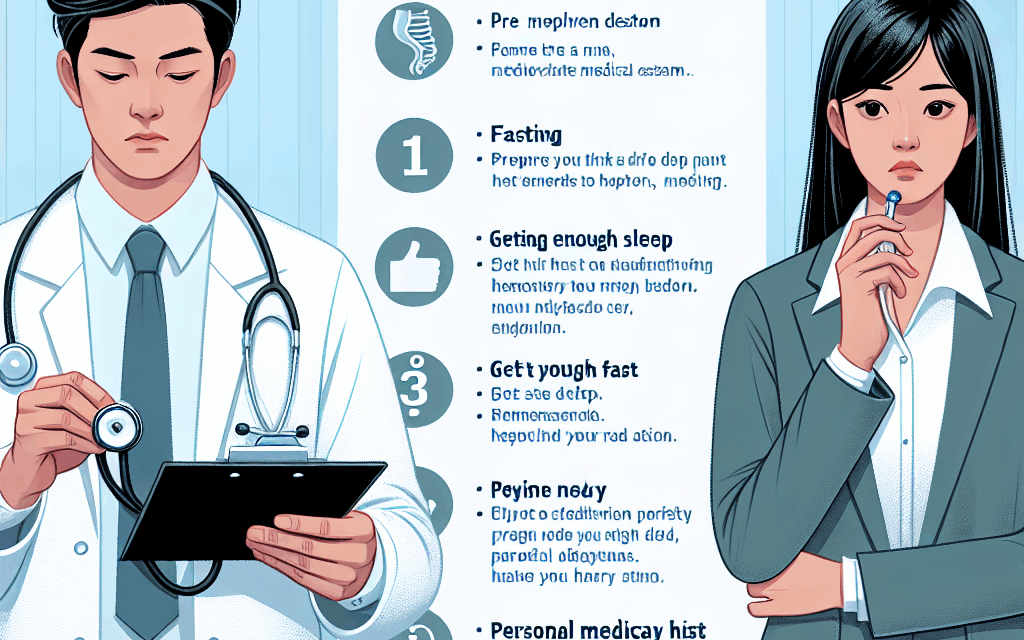Essential Insights for Candidates Before Undergoing a Pre-Employment Medical
In today’s competitive job market, candidates often face a variety of hurdles before securing their desired positions. One such hurdle is the pre-employment medical examination, a process that can be both daunting and confusing. Understanding the purpose, procedures, and implications of these medical assessments is crucial for candidates. This article aims to provide essential insights into pre-employment medicals, helping candidates navigate this often-overlooked aspect of the hiring process.
Understanding the Purpose of Pre-Employment Medicals
Pre-employment medical examinations serve several critical functions in the hiring process. Employers utilize these assessments to ensure that candidates are physically and mentally fit for the roles they are applying for. Here are some key purposes of pre-employment medicals:
- Assessing Fitness for Duty: Employers need to confirm that candidates can perform the essential functions of their job without risking their health or safety.
- Reducing Workplace Injuries: By identifying pre-existing conditions, employers can take proactive measures to minimize the risk of workplace injuries.
- Compliance with Legal Requirements: Certain industries, such as transportation and healthcare, have specific legal requirements regarding employee health.
- Protecting Company Assets: Healthy employees are less likely to incur high healthcare costs, which can impact a company’s bottom line.
- Promoting a Healthy Work Environment: Employers are increasingly focused on employee wellness, and pre-employment medicals are a step towards fostering a healthy workplace.
Understanding these purposes can help candidates appreciate the necessity of the examination and prepare accordingly. For instance, candidates applying for physically demanding roles may need to demonstrate their physical capabilities, while those in safety-sensitive positions may be evaluated for substance use or mental health issues.
What to Expect During a Pre-Employment Medical Examination
Knowing what to expect during a pre-employment medical examination can alleviate anxiety and help candidates prepare effectively. The examination typically includes several components:
- Medical History Review: Candidates will be asked to provide a detailed medical history, including any chronic conditions, medications, and previous surgeries.
- Physical Examination: A healthcare professional will conduct a physical examination, which may include checking vital signs, assessing mobility, and evaluating overall health.
- Laboratory Tests: Blood tests, urine tests, and other laboratory analyses may be conducted to check for various health indicators, including drug use and infectious diseases.
- Vision and Hearing Tests: Depending on the job requirements, candidates may undergo tests to assess their vision and hearing capabilities.
- Fitness Assessments: For physically demanding roles, candidates may be required to complete fitness assessments to evaluate their strength, endurance, and flexibility.
Each of these components serves a specific purpose in evaluating a candidate’s health. For example, a medical history review can reveal potential health risks that may affect job performance, while laboratory tests can identify underlying conditions that may not be immediately apparent. Candidates should approach the examination with honesty and transparency, as discrepancies in medical history can lead to complications later in the hiring process.
Common Concerns and Misconceptions
Many candidates harbor concerns and misconceptions about pre-employment medical examinations. Addressing these issues can help candidates approach the process with a clearer mindset:
- Privacy Concerns: Candidates often worry about the confidentiality of their medical information. It’s important to know that healthcare providers are bound by laws to protect patient privacy.
- Fear of Disqualification: Some candidates fear that any pre-existing condition will lead to automatic disqualification. However, many employers focus on whether a candidate can perform the essential functions of the job with or without reasonable accommodations.
- Understanding of Medical Terminology: Candidates may feel overwhelmed by medical jargon. It’s advisable to ask questions and seek clarification during the examination.
- Impact on Job Offer: Candidates may worry that the results of the medical examination will negatively impact their job offer. However, employers typically consider the overall qualifications of a candidate before making a final decision.
- Cost of Medical Examinations: Some candidates may be concerned about the financial burden of medical examinations. In many cases, employers cover the costs associated with pre-employment medicals.
By addressing these common concerns, candidates can approach the pre-employment medical examination with greater confidence. Understanding the process and its implications can help alleviate anxiety and foster a more positive experience.
Preparing for the Pre-Employment Medical Examination
Preparation is key to ensuring a smooth pre-employment medical examination. Here are several steps candidates can take to prepare effectively:
- Gather Medical Records: Candidates should collect relevant medical records, including vaccination history, previous medical evaluations, and any ongoing treatments.
- Review Job Requirements: Understanding the physical and mental demands of the job can help candidates prepare for specific assessments that may be required.
- Be Honest About Medical History: Transparency is crucial. Candidates should disclose any pre-existing conditions or medications to avoid complications later on.
- Stay Healthy Before the Examination: Candidates should prioritize their health leading up to the examination by maintaining a balanced diet, exercising, and getting adequate rest.
- Ask Questions: Candidates should not hesitate to ask questions about the examination process, what to expect, and how results will be used.
By taking these preparatory steps, candidates can approach the pre-employment medical examination with confidence and clarity. Preparation not only helps in achieving favorable results but also demonstrates a candidate’s commitment to their health and the job they are applying for.
Understanding the Implications of Medical Examination Results
The results of a pre-employment medical examination can have significant implications for candidates. Understanding these implications is essential for making informed decisions:
- Job Offer Status: Depending on the results, candidates may receive a job offer, be placed on hold pending further evaluation, or, in some cases, be disqualified from consideration.
- Need for Accommodations: If a candidate has a pre-existing condition, they may need to discuss potential accommodations with the employer to ensure they can perform their job effectively.
- Impact on Future Employment: Candidates should be aware that medical examination results may be shared with future employers if they apply for positions in similar industries.
- Health Insurance Considerations: Candidates may need to consider how their health status could impact their eligibility for health insurance coverage.
- Legal Rights: Understanding legal rights regarding discrimination based on health status is crucial. Candidates should familiarize themselves with laws such as the Americans with Disabilities Act (ADA) to protect their rights.
By understanding the implications of medical examination results, candidates can better navigate the hiring process and make informed decisions about their employment opportunities. It is essential to approach the results with a clear understanding of one’s rights and options.
Conclusion
Pre-employment medical examinations are a critical component of the hiring process that candidates should approach with knowledge and preparation. By understanding the purpose of these examinations, what to expect, common concerns, preparation strategies, and the implications of results, candidates can navigate this process with confidence. Ultimately, being informed empowers candidates to advocate for their health and well-being while pursuing their career goals.
As the job market continues to evolve, candidates must remain proactive in understanding the various aspects of employment, including health assessments. By doing so, they can enhance their chances of securing their desired positions while ensuring their health and safety in the workplace.





